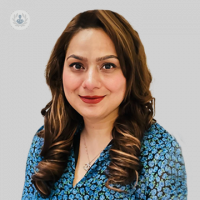What is the ideal level of cholesterol?
Written by:Cholesterol can be split into two categories: good cholesterol (HDL), and bad cholesterol (LDL). In her latest article, renowned endocrinologist and consultant physician Dr Sobia Arshad explains the difference between these different types of cholesterol, as well as the ideal level of both.

What is cholesterol and how much is too much?
Cholesterol, in simple terms, is fat. Whatever we eat must be converted into something that the body can then store. Lots of patients come and say that they don’t eat any fat or sugar, but whatever we eat must be changed into sugar or fat in order to be stored in the human body.
There are two types of cholesterol:
- Healthy cholesterol (HDL)
- Unhealthy cholesterol (LDL)
Healthy cholesterol does not get stored in the arteries and doesn’t compromise blood flow, as opposed to unhealthy cholesterol which does both.
The maximum measurement of cholesterol before health problems occur is considered to be 5mmol/L, however, less than 4mmol/L is considered ideal.
It is also strictly 4mmol/L for people with diabetes.
HDL levels (the good cholesterol) are ideally higher than 1mmol/L. If you have better levels of HDL, then there is some leniency with your LDL, or bad cholesterol levels. A high level of good cholesterol can balance out the bad cholesterol. In general, an LDL level of less than 2mmol/L is considered ideal.

What can cause high levels of cholesterol in the blood?
There are various factors that can affect the amount of cholesterol in the blood.
A sedentary lifestyle - Sitting down for a long period of time can cause the blood to flow slowly. It also uses up calories slowly, as the food we eat is not being used so it gets stored as cholesterol
Eating more than we need can also increase this risk.
Some people are genetically predisposed to not metabolising fat correctly leading to higher cholesterol levels.
Dr Sobia Arshad is a revered endocrinologist and consultant physician based in London. If you would like to book a consultation with Dr Arshad, you can do so today via her Top Doctors Profile.


